Fortnight #1: Unlearning as a Starting Point
🇦🇷 Clickeá acá para leer este artículo en español.
As a reflective practice and to keep myself writing, I'm going to try to summarize what's been going on every two weeks.
My main goal with this is to keep a record of what I'm doing and thinking, and maybe, if I keep it up over time, I'll be able to see how everything evolves.
Starting Point
I'm at a pretty pivotal moment in my career: I stopped chasing the "dream" of living off video games.
There are several motivations behind this decision, and it may take time and a lot of reflection to write about them all. But in short, the conditions imposed by living off video games on my personal life and mental health do not align with my reality or what I want anymore.
That's why I decided to take a pause, recalibrate, and see where I really want to go.
Why Do I Do What I Do?
This is one of the main questions that I feel is drifting further from our consciousness. The frenzy is so normalized that there are moments when I lift my head and think, what the hell?
While there's an eternal debate about whether all behavior has intention behind it—whether conscious or unconscious—there is a horizon of action1 in day-to-day life that is the true domain of what we call "free will."
I'm increasingly convinced that there are very few things we do that are truly important and have a big impact, and a large number of things are completely useless, though we convince ourselves otherwise.
One of the things I want to understand in the coming years is what these important things are and prioritize them.
What Am I Doing?
First and foremost, I've been working on unlearning a lot of nonsense that the millennial world of late capitalism imposed on me without permission.
The migraines I've been suffering from since 2019 forced me to reconsider my definitions of work, success, productivity, and life in general.
It's tough to look back and realize that many of the behaviors and motivations I had were essentially imposed by others or by collective ideals of the time.
Returning to my blog, then, is a way to reflect on and explore myself, but also to open myself serendipitously to new connections with those seeking something similar or resonating with what's on my mind.
I Create, Therefore I Am
If I have to define a constant in my life, it's that pulsating need to create.
My curiosity about how things are made and the development of creative skills has been with me always.
In a world where when we're not working, we're consuming, and when we're not consuming, we're working; creating is countercultural resistance.
But this idea falls apart if creation is under the rules imposed by platforms thirsty for "content."
There's a Gulgumbro that stirs within me every time I see young people (and not-so-young people) talking about "my creativity" and "my projects" referring to a YouTube channel, an Instagram, or TikTok account.
It's tough to watch the immense mass of unpaid workers filling the coffers of billionaire companies that built a transgenerational dream based on hyper-optimized social game loops.
These reflections made me think that the forms of creation I truly enjoyed in the past were those with intrinsic, not extrinsic, motivations.
I'm trying to return to that form of creation, and this blog is the first step in that direction.
So, What Now?
At the moment, I have some interests I want to explore:
- Writing and Interactive Fiction: I want to get back to writing. I already have career capital, now I can trade it2 for the freedom to develop myself as a writer. Interactive fiction seems like a very interesting format to explore, and I'd like to do something in that direction.
- Artificial Intelligence: Although I'm in an ethical gray area regarding the use of language models due to their energy consumption, I'm very interested in exploring their use as tools to assist our brains as opposed to replacing them.
- Reading: I've been reading a bit more again. I've been kind of stuck since we traveled to Canada, but now I'm able to pick up the habit again.
So here we go with the update…
Reading
If you're interested in seeing what I'm reading in real-time, you can check out my StoryGraph profile. I don't use Goodreads because, well, fuck Amazon.
This fortnight, I finished Parásitos Perfectos by Luis Carlos Barragán.
In the link, there's a short review, but it simply brought back a lot of creative energy.
I'm now reading Las cosas que perdimos en el fuego (Things We Lost in the Fire) by Mariana Enriquez.
I bought several books this month, which I plan to devour soon and share my thoughts:
- Las cosas que perdimos en el fuego (Things We Lost in the Fire) by Mariana Enriquez
- La sombra de un jinete desesperado (The Shadow of a Desperate Rider) by Juan Mattio
- Paisajes Experimentales (Experimental Landscapes) by VVAA
- La hija del delta (The Delta's Daughter) by Alejandra Bruno
- Trilogía del agua (The Trilogy of The Water) by Claudia Aboaf
- Capitalist Realism by Mark Fisher
Writing
In the last two weeks, I haven't written more than a couple of blog posts.
I have a few stories waiting to be written and one or two ideas for interactive fiction.
I hope putting this space on the blog will force me to make progress on story creation.
Cuentitos Studio
I'm working on Cuentitos Studio, an interactive narrative development environment assisted by artificial intelligence.
Right now, it's in a sort of alpha state. It works, but it's rough.
Like every programmer obsessed with quality, I feel tempted to scrap everything and start from scratch, especially since I've been having lots of ideas that would require a major rewrite and aren't quite justified.
At the same time, I feel like I haven't yet reached a minimum viable version that demonstrates the vision I have for the environment, which is why I haven't started over.
Technical Issues
Cuentitos Studio is based on two main pillars:
- Cuentitos: the interactive narrative programming language designed to make our lives easier when expressing flow and randomness in our stories.
- Editor: The editor with integrated AI that helps us write our stories.
Right now, I have a pretty polished version of the language and runtime that works both on the web and in Godot, and I have a very basic yet functional version of the editor.
The biggest technical issue I'm facing right now is getting the AI agents to work properly most of the time.
For this, I'd need to invest time in implementing some sort of system for tracing conversations to evaluate the quality of responses and improve the prompts and contexts of the assistants.
The problem is I need a minimum user volume, but everything's still kind of broken, so I can't really ask people to use it daily.
Business Issues
Until recently, I was considering building Cuentitos Studio as a bootstrapped startup3, but I have doubts about whether this is economically viable, at least for the kind of company that would justify the effort to realize my vision for the project.
Large Companies
The main problems I found when analyzing requirements to think about potential solutions for large companies are:
- NDAs4: Large companies have their employees under NDAs that prevent them from talking to third parties about internal tools and features.
- In-House Development: Large companies that could maintain an interactive narrative development environment already have their own internal tools, whether ideal or not, and it may be hard to convince them to switch.
- Writers have little decision-making power: Most of the time, writers don't have the power to decide which tools to use; companies impose the tools they use, which may or may not be a problem depending on how the product is approached.
These issues lead me to believe that large companies are not a good target for Cuentitos Studio. Moreover, few of these companies would benefit from a dynamic text management tool since their games usually don't have a strong textual component.
Also, honestly, I don't want to spend time talking to CTOs of large companies to convince them to buy my product.
Hobbyists
Being alone and with limited energy, I can't and don't want to run a B2C5 business. I don't have the capacity to provide support, do marketing, onboarding, or any of the other things needed to have a mass-market product.
So What's Left?
What's left is a target of medium or small companies that have a development team that can't afford to implement something like Cuentitos Studio but need an interactive narrative development environment.
This target is pretty small because there are already tools that tackle this market for free, like Ink, Twine, and others.
Now, the question is, is it worth continuing with Cuentitos Studio as a business venture?
I'll leave it as a cliffhanger because I don't have an answer yet.
My main business goal is to answer this question.
But I started this post talking about how I want to create in an anti-capitalist way, so why am I still talking about "business"? 🤷♂️
There's always the possibility that Cuentitos Studio will end up being more of a community-serving project and won't turn into a sustainable business.
Garden
One of the activities I'm most interested in exploring when we move to Mar del Plata is gardening.
That's why Aldi and I have been experimenting in our patio. In the first half of the year, we grew basil, arugula, cilantro, and carrots.
Now we've upped the stakes and planted tomatoes, cucumbers, squash, and pak choi.
To companion plant with the squash, we planted marigolds, and we've replanted basil, but the ants ate it, so this week we'll be planting seeds again.
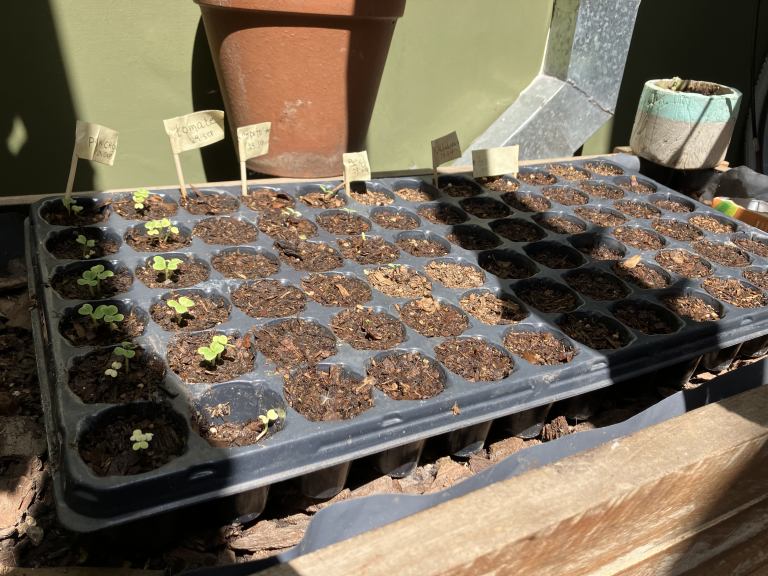
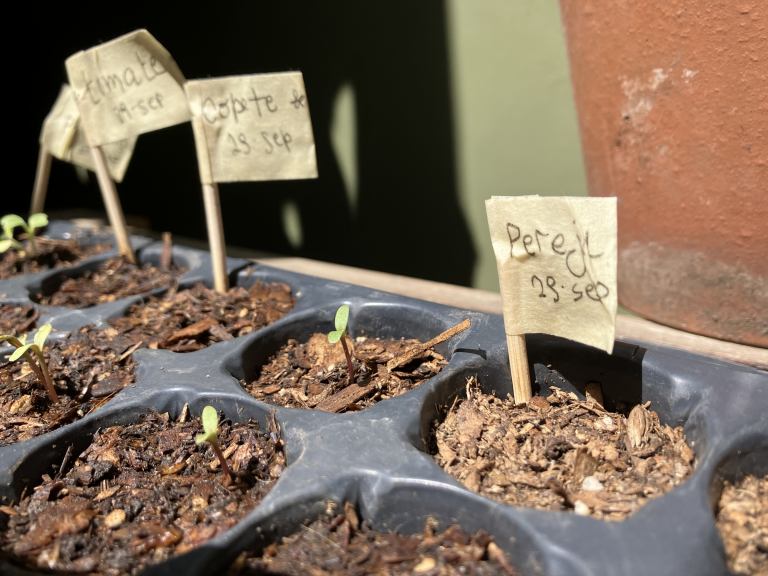
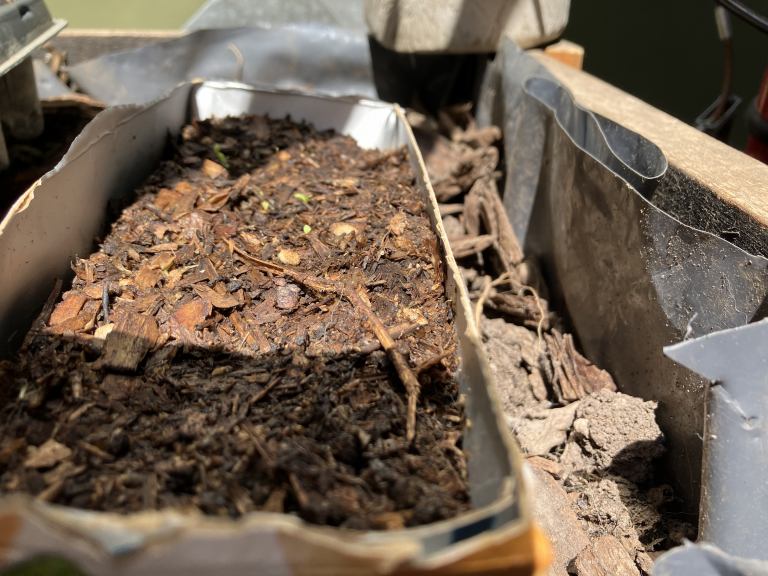
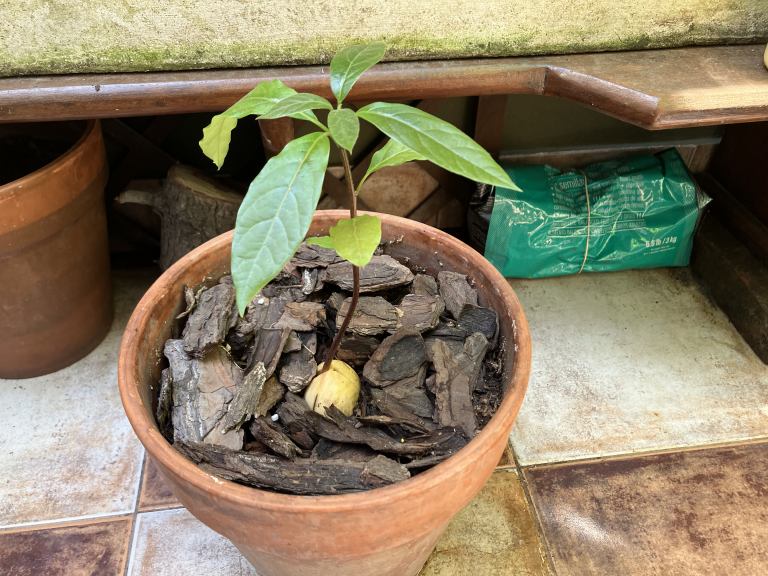
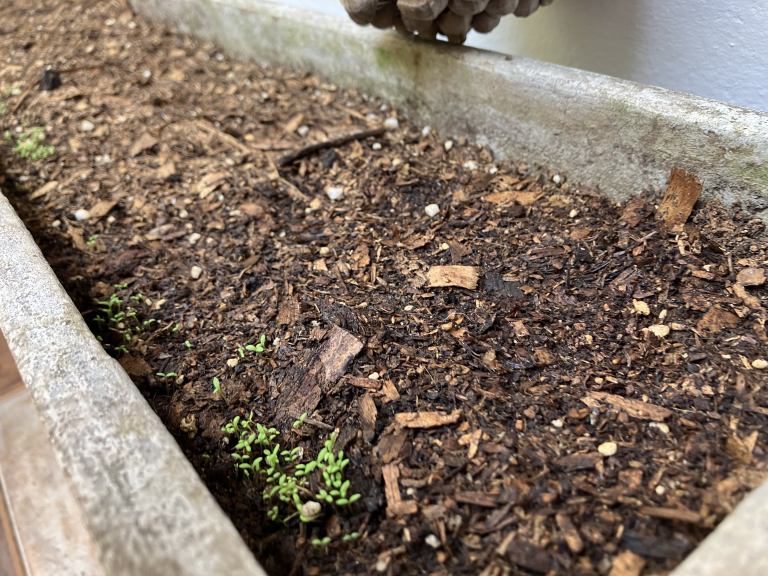
Conclusion 🌈 🦄
If you've made it this far, you're either my mom or a bit crazy.
In summary: I want to write, read, and create the best interactive fiction development environment in the world.
But I don't want it to steal the mental space I need to be with Aldi and Dori, which is why I'm going to approach everything completely differently from how I did in the past, using the principles of Slow Productivity as I mentioned in the 10-year post.
If you have any questions or comments about something I've said, don't hesitate to write me at hola at frantufro dot com.
-
I use the concept of the "Horizon of Action" that Brian Upton presents in his book "The Aesthetic of Play" to refer to the space of possible actions available to us at a given moment. This horizon contrasts with the "Horizon of Intention," which is the space of possibilities we believe we have. ↩
-
"Career Capital" is a concept proposed by Cal Newport in "So Good They Can't Ignore You" (2012). It refers to the set of skills, knowledge, connections, and credentials that make a person valuable in the job market. This approach suggests that instead of "following your passion," it's more effective to develop rare and valuable skills to build a satisfying career. Career capital accumulates over time and experience, allowing individuals to gain more control over their career trajectory and negotiate better working conditions. ↩
-
I'm referring to a company that funds itself without external investors and grows from its own revenue. The term "bootstrap" comes from the expression "pulling yourself up by your bootstraps," referring to the idea that the company lifts itself without outside help. ↩
-
Non-Disclosure Agreement: a contract companies have employees or other companies sign to prevent them from disclosing confidential information about their projects. This may include details about how things are done, how internal systems work, or any other information the company considers sensitive or strategic. ↩
-
B2C: Business to Client is a business model where a company sells products or services directly to end consumers. In contrast, the B2B (Business to Business) model refers to companies selling products or services to other companies. ↩